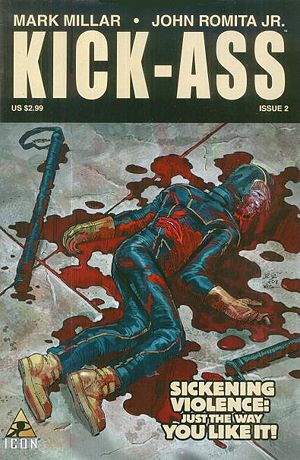Kick-Ass (2010) is the superhero film for our time. It is the product of the geek-chic age, the subsequent proliferation of comic book movies, and a postmodern ironic sensibility. In a year it will cease to be so relevant and become merely a symbol of a time gone by, but right now Kick-Ass is perfect. It is hilarious, it is sadistic, and it is brilliantly self-aware.
Kick-Ass Red-Band Trailer
Kick-Ass critiques the fictionality of superheroes and simultaneously gives us the fantasy of them. The film's real-world grounding demonstrates the implausibility of masked vigilantes, but its plot and characters venerate the underlying moral fantasy of the concept. The movie invites us to question the heroes' motivations but clearly wants us to support them. Kick-Ass openly acknowledges his own psychosis for choosing to dress up like a superhero, and even compares himself to a serial killer. At the same time he is a good, stupid kid who just wants to do the right thing and gets in way over his head, and so his story is more endearing than horrifying.
Other heroes like Big Daddy and his twelve-year-old daughter Hit Girl are more akin to actual superheroes but are here seen in the context of our reality. They further demonstrate the mental instability necessary to actually become a vigilante but also the moral relativism that allows us to root for them. While Big Daddy is openly deranged and has brainwashed his daughter, his reasoning nevertheless invites sympathy and she simply doesn't know any better. Furthermore, the bad guys are so one-dimensionally evil that they deny all sympathy and seem ripe for swift, painful justice. Kick-Ass may take place in our world but many of its characters are of a distinctly comic book nature, and the contrast results in a simultaneous critique and embrace of the superhero fantasy.
In Kick-Ass we are shown the impossibility and foolhardiness of the superhero concept. At the same time the movie is itself a loving product of that fantasy and embraces the very fiction it dismantles. The film gives us the satisfaction of seeing the noble underdogs get the chance to triumph over evil and their own limitations, which itself is the true appeal of comic book superheros. By both critiquing and reproducing it, Kick-Ass lets us have our cake and eat it too. It is incredibly fun and should not be missed by fans of the genre.
Adapted from Mark Millar's comic series, Kick-Ass explores what could happen if a real person actually started dressing up like a superhero and taking the law into their own hands. The results are extremely messy and give the movie a stylized "realism" through the abundance of blood and bruising that is unusual in a comic book movie. As its advertising implies, Kick-Ass is not for the squeamish. The viewer feels each act of violence upon the heroes because their wounds are highlighted both visually and narratively. Each punch has an acknowledged effect, leading the viewer to conclude that the heroes will end up dead if they keep at their dangerous quest for justice.
The film also takes great pains to ground itself squarely in the contemporary reality of western culture: the characters openly discuss the likes of Superman and Batman throughout, Nicholas Cage does an obvious impersonation of Adam West while wearing his "Big Daddy" costume, and current events like the upcoming Lost finale are discussed (hence the time-specific relevance). The result of the graphic violence and cultural identification is that the movie feels like it's taking place in our world. Titular hero Kick-Ass seems like a genuine, average high-school student living in New York (Toronto if you recognize the landmarks), and his desire to become a masked vigilante is as relateable as it is delusional.
The film also takes great pains to ground itself squarely in the contemporary reality of western culture: the characters openly discuss the likes of Superman and Batman throughout, Nicholas Cage does an obvious impersonation of Adam West while wearing his "Big Daddy" costume, and current events like the upcoming Lost finale are discussed (hence the time-specific relevance). The result of the graphic violence and cultural identification is that the movie feels like it's taking place in our world. Titular hero Kick-Ass seems like a genuine, average high-school student living in New York (Toronto if you recognize the landmarks), and his desire to become a masked vigilante is as relateable as it is delusional.
An example of the ultraviolence in the comic book Kick-Ass
Other heroes like Big Daddy and his twelve-year-old daughter Hit Girl are more akin to actual superheroes but are here seen in the context of our reality. They further demonstrate the mental instability necessary to actually become a vigilante but also the moral relativism that allows us to root for them. While Big Daddy is openly deranged and has brainwashed his daughter, his reasoning nevertheless invites sympathy and she simply doesn't know any better. Furthermore, the bad guys are so one-dimensionally evil that they deny all sympathy and seem ripe for swift, painful justice. Kick-Ass may take place in our world but many of its characters are of a distinctly comic book nature, and the contrast results in a simultaneous critique and embrace of the superhero fantasy.
In Kick-Ass we are shown the impossibility and foolhardiness of the superhero concept. At the same time the movie is itself a loving product of that fantasy and embraces the very fiction it dismantles. The film gives us the satisfaction of seeing the noble underdogs get the chance to triumph over evil and their own limitations, which itself is the true appeal of comic book superheros. By both critiquing and reproducing it, Kick-Ass lets us have our cake and eat it too. It is incredibly fun and should not be missed by fans of the genre.


